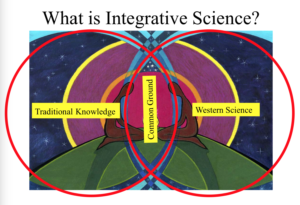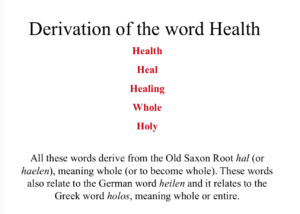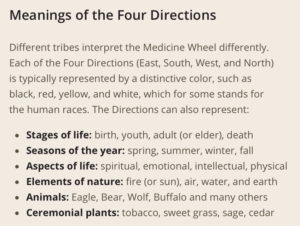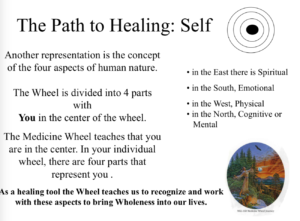Topic Exploration (Ask):
- Holistic Health and Wellness
- The Medicine Wheel
Since graduating high school, I have been interested in the impacts of our lifestyle on our holistic wellness. In my experience, kids know they are supposed to “eat healthy” and “exercise”, but have little to no knowledge or experience on how this directly affects their wellness. The more I learned about the impact of lifestyle and taking care of ourselves on my own, the more I realized it was something that was not discussed in my educational journey. Wellness is not just our physical health, but a combination of optimal wellness in the physical, mental and spiritual sense.
Initial Thoughts and Questions:
- What is holistic health and wellness?
- What is the history of Western medicine; what are the pros and cons?
- How do we achieve optimal health and wellness? Is it something that can be achieved?
- Who decides what health means? Can someone else label us as healthy, or is it something only we can do by looking within?
- How do our lifestyle choices and habits impact our wellness, and what role do these choices play on the function of our body systems?
For me, knowing I have the control over my body and how I feel, mentally, physically and spiritually is what makes it alive. Do kids know that when they aren’t feeling well, there are things they can do to help? Do they reflect on how they feel after a walk? Do they recognize feelings of stress in their body after working on a difficult topic? Why do they feel tired physically after having a disagreement with a friend?
Our minds, bodies and souls are intertwined so greatly; however, we underestimate this system. Although modern-day western medicine has moved us great strides towards a “healthier” society, one of the “downfalls of Western medicine is the often siloed approach to health, which looks at the body in sections of individual symptoms and pieces rather than the whole system it really is” (Faletra, 2020, n.p.)
This quote struck meaning for me, as I truly believe that this is how health, wellness and the human body is taught in most classroom settings. We have our cardiovascular system, the musco-skeletal system, the digestive system and so on in the BC grade 5 Science curricula (2020). Then we have a hard try at incorporating health and wellness into the PHE curriculum, but is something that seems to overwhelm me and often is taught quickly, with no relation to how these choices impact our minds, or souls, or in fact barely even a thought to how our choices may impact our physical selves or body systems.
Faletra (2020) goes on to explain this is where holistic health shows its true importance- in order to “achieve optimal health and wellness in the physical, mental and spiritual sense, we have to be viewing and supporting the body as the incredible system it is” (Faletra, 2020, n.p.). My goal is to incorporate this idea of viewing and supporting the whole body system, as one in my classroom.
So, what is holistic health? It is “often defined as a form of healing that looks at the whole person: body, mind, and spirit” (Faletra, 2020, n.p.). We are living in a world where people are living longer, but are still stressed, fatigued and out of tune with their bodies. We are consuming nutrient depleted foods, exposed to harmful chemicals in the air, water, cleaning and hygiene supplies. “Holistic health also takes into account the many external and environmental factors which could be supporting or impacting our overall health and wellness” (Faletra, 2020, n.p.)
April St. Louis, a peer (personal communication, July 7, 2020). suggested taking a look at the medicine wheel as she felt it was a good example of how I was describing my topic. The medicine wheel can now be used as an example of integrative science (see below image), combining traditional knowledge with Western science to solve health related problems, or seek answers regarding health and wellness (Doucette et al., 2004).

According to Webster’s New Dictionary College Edition (Doucette et al., 2004, p.2), “health is: physical and mental well-being, soundness; freedom from defect or pain or disease, normality of mental and physical function.” The authors then go on to ask, “but where is emotion and spirituality? This is where the Aboriginal ways of knowing come in to play with holistic health. Doucette et al. (2004) define health as “the overall well-being of an animate object that includes not only the Physical and Mental aspects, but also the Spiritual and Emotional” (p.2). This connection between the Aboriginal ideas of health, and what I have learned about holistic wellness, I see a clear connection. Doucette et al. (2004, p.3) also discussed the word health and how it was derived (see below).

The medicine wheel has many different representations of the natural world. It is often used to organize thoughts in order to share knowledge gained from experiences. Some examples are shown in the image below (National Library of Medicine, 2020, n.p.).

For the purpose of this topic, I have chosen to focus on the “Four Aspects of Human Nature” (see below image). This idea incorporates the aspects of holistic health, from an Aboriginal traditional perspective. Each section of the wheel is an important aspect of our well-being- Mental, Physical, Spiritual and Emotional selves.

As I explored holistic wellness, and the medicine wheel’s teachings, I realized the wheel itself and the aspects of our well-being is more than a broad enough topic. I feel a strong desire to continue to learn more and see an opportunity to naturally connect my initial topic to Aboriginal ways of knowing and being.
Other Key Questions:
- How can we connect the medicine wheel to our own holistic wellness?
- What does it mean to live a balanced lifestyle?
- Why is wellness something that is individualized/different for everyone?
- How do we know we are working towards achieving optimal health and wellness?
- What does the health and wellness mean to me?
I also found value in this ted talk (Arcand, 2014), discussion living a circular life. It raises questions for me that may be related to this topic.
- What does it mean to live a circular life?
- What does balance have to do with a circle?
- How is the medicine wheel incorporated into the idea of a circular life?
Thank you for reading! I look forward to brainstorming a project in relation to these ideas.